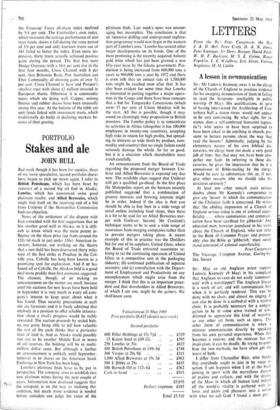Stakes and ale
PORTFOLIO JOHN BULL
Bad week though it has been for equities, three of my more speculative, second portfolio shares have begun to pick up steam again. I refer to British Petroleum, which has been beset by rumours of a second big oil find in Alaska; Lonrho, which has announced some good platinum results; and Allied Breweries, which might find itself on the receiving end of a bid from Unilever if the Monopolies Commission finds no objection.
News of the settlement of the dispute with Iran coincided with the first suggestions that Br has another good well in Alaska, so it is diffi- cult to know which was the more potent in- fluence on the share price (up from around the 132s 6d mark to just under 150s). American in- vestors, however, are working on the theory that a new field has been discovered thirty miles west of the first strike at Prudhoe in the Col- ville area. Colville has long been known as a promising spot for exploration. And if BP has found oil at Colville, the Alaskan field is a good deal more prolific than first estimates suggested. The chances, though, of BP making an announcement on the matter are small, because until the auctions for new leases have been held in September it is very much in every oil com- pany's interest to keep quiet about what it has found. Thus security precautions at each site are ferocious and it is freely admitted that anybody in a position to offer reliable informa- tion about a rival's progress would be richly rewarded. The auction proceeds by sealed bids, no one party being able to tell how valuable the rest of the pack thinks that a particular tract of land is. And as Alaska could possibly run out to be another Middle East in terms of oil reserves, the bidding will be in multi- million dollar sums. But although a further BP announcement is unlikely until September, turnover in BP shares on the American Stock Exchange in New York has been hugs. Lonrho's platinum finds have to be put in perspective. The company aims to establish two new platinum mines during the next couple of years. Information now disclosed suggests that the company is on the way to realising this ambition, but much more evidence is needed before outsiders can judge the value of the platinum finds. Last week's news was encour- aging but incomplete. The conclusion is that an 'intensive drilling and underground explora- tion programme would now begin in the western part of Lonrho's area.' Lonrho has several other major developments on its hands. One of the most promising is the recently acquired Ashanti gold mine which has just been granted a new fifty-year lease by the Ghana government. Pro- duction is being increased from 600,000 tons a years to 960,000 tons a year by 1972 and there is even talk that an annual rate of 1,500,000 tons might be reached soon after that. It has also been evident for some time that Lonrho is interested in putting together a major opera- tion in the Congo and there have been rumours that a bid for Tanganyika Concessions (which owns 17 per cent of Union Mini&re) will be the start. All this is possible, though it may sound an alarmingly risky proposition to British investors. The Lonrho policy is to concentrate its activities in Africa (altogether it has 100,000 employees in twenty-one countries), accepting high risks in return for high profits, but spread- ing its interests so wide (both by product, com- modity and country) that no single failure could seriously damage the whole. So far so good, but it is a situation which shareholders must watch carefully.
An announcement from the Board of Trade regarding the proposed merger between Uni- lever and Allied Breweries is expected any day now. The available clues suggest that Unilever will get a qualified go-ahead. In the first place the Monopolies report on the brewers recently published suggested that a combination of grocery interests and brewing interests might be in order. Indeed if the idea is that you should be able to buy beer in a wide range of retail outlets including food shops, then there is a lot to be said for an Allied Breweries mer- ger with Unilever. Second, Mr Crosland's technique seems to be to seek a wide range of assurances from merging companies rather than to prevent mergers taking place. A recent example of this in practice was the Distillers bid for one of its suppliers, United Glass, where the Board of Trade extracted assurances re- lating to (a) the continuing operation of United Glass as a competitive unit in the packaging industry; (b) continued publication of separate accounts; and (c) consultation with the Depart- ment of Employment and Productivity on any unemployment which might arise from the merger. I think that this is an important prece- dent and that shareholders in Allied Breweries, of which I am one, might be the gainers. We shall know soon.
Valuations at 21 May 1969 First portfolio £6,435 (details next week) Second portfolio 600 Pillar Holdings at 17s 7-Id ..
• •
£529 15 Kaiser Steel at £39 12s ..
• •
£595 250 Lonrho at 51s
- •
£637 100 British Petroleum at 149s 6d
• •
£748 300 Vosper at 20s 9d
• •
£311 1,000 Allied Breweries at 19s 3d
• •
£963 300 J. Bibby at 29s . . , £435 100 Burmah Oil at 112s 6d • •
• •
£562 Cash in hand • • • • £915 £5,695 Deduct: expenses £185 Total £5,510






































 Previous page
Previous page